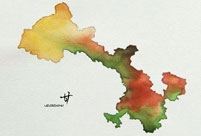 Africans in Guangzhou
Africans in Guangzhou
 Pole dancer shows strength and beauty up in the air
Pole dancer shows strength and beauty up in the air
 College girls call for protection of ecological space on earth
College girls call for protection of ecological space on earth
 Top 10 celebrities driving auto brands
Top 10 celebrities driving auto brands
 10 low-carbon tips to save money
10 low-carbon tips to save money
 Luxury cars make Asia premiere at Auto China
Luxury cars make Asia premiere at Auto China
 Versatile dog
Versatile dog
 Ni Ni covers BAZAAR JEWELRY
Ni Ni covers BAZAAR JEWELRY
 Cherry blossoms reach peak bloom in Washington D.C.
Cherry blossoms reach peak bloom in Washington D.C.
 Top Chinese fashion icons in foreigners' eyes
Top Chinese fashion icons in foreigners' eyes
MANILA, April 28 -- The Philippines and the United States signed on Monday a 10-year defense pact that would expand the rotational presence of U.S. forces in the country, a few hours before the expected arrival of U.S. President Barack Obama here for a state visit.
The "Enhanced Defense Cooperation Agreement" (EDCA) was signed by Philippine Defense Secretary Voltaire Gazmin and U.S. Ambassador to the Philippines Philip Goldberg.
"The signing of EDCA between the Philippines and the United States affirms the robust and enduring strategic partnership between the two countries," said Presidential Communications Operations Office Secretary Herminio Coloma, Jr. in a statement.
The EDCA was signed after nearly two years of "intensive" negotiations between U.S. and Philippine panels.
The pact was initially dubbed as "Increased Rotational Presence Framework Agreement," but the U.S. and Philippine panels decided to change the title.
"The change in the title reflects the desire of the Philippines and the U.S. for a more comprehensive agreement that covers the full range of enhanced defense cooperation. Increased rotational presence is just one modality of enhanced defense cooperation," said Philippine Foreign Affairs Secretary Albert del Rosario.
Philippine officials said EDCA, which will have an initial term of 10 years, is envisioned to advance the implementation of the Mutual Defense Treaty (MDT).
The military pact will be signed as an executive agreement and will not require ratification of Philippine Congress.
A primer on the EDCA released by the Philippine Department of Foreign Affairs indicates that the accord will not allow the U.S. to establish a permanent military presence in the Philippines.
Washington will have to seek the permission of Manila to use facilities owned and controlled by Philippine military. The U.S. has also agreed not to bring in nuclear weapons in Philippine military facilities.
The pact, however, did not provide information as to the definite number of troops that will be allowed entry into military facilities in the country.
The EDCA was signed a few hours before the expected arrival of U.S. President Barack Obama in the country for a state visit. Obama will stay in the Philippines until Tuesday.
For decades, the U.S. maintained large military bases in the northern Philippine areas of Clark and Subic Bay until Philippine congress voted to close them down in 1991.
American forces returned to the country eight years later under the Visiting Forces Agreement, which was ratified by the Senate in 1999 to govern the temporary stay of U.S. forces for joint training with the Philippine military.
 Hand-painted maps go viral online; painter's name remains unknown
Hand-painted maps go viral online; painter's name remains unknown 4th Beijing Int'l Film Festival ends
4th Beijing Int'l Film Festival ends Commando elite specializes in sign language
Commando elite specializes in sign language Man photoshops himself into girlfriend's childhood photos
Man photoshops himself into girlfriend's childhood photos Photo story: Stallholders at Beijing Zoo Wholesale Market
Photo story: Stallholders at Beijing Zoo Wholesale Market Artists on backstage
Artists on backstage Beckham launches fund to support youth soccer in China
Beckham launches fund to support youth soccer in China Cherry blossoms hit peak bloom in Washington D.C.
Cherry blossoms hit peak bloom in Washington D.C. Children in ancient costumes learn Zhusuan
Children in ancient costumes learn Zhusuan Cute Shaolin boy melts the hearts of millions
Cute Shaolin boy melts the hearts of millions Giant panda Sijia is back to happy life
Giant panda Sijia is back to happy life Richest Chinese of 2014: half from the mainland
Richest Chinese of 2014: half from the mainland Chengdu - laid-back lifestyle makes happiest city
Chengdu - laid-back lifestyle makes happiest city The backstage of the Fashion Week
The backstage of the Fashion Week College students in Han costumes
College students in Han costumesDay|Week|Month